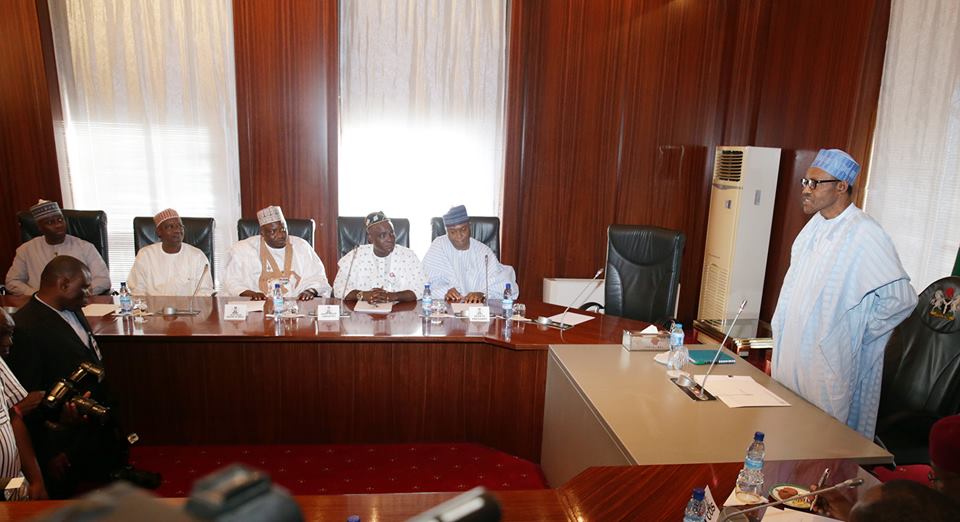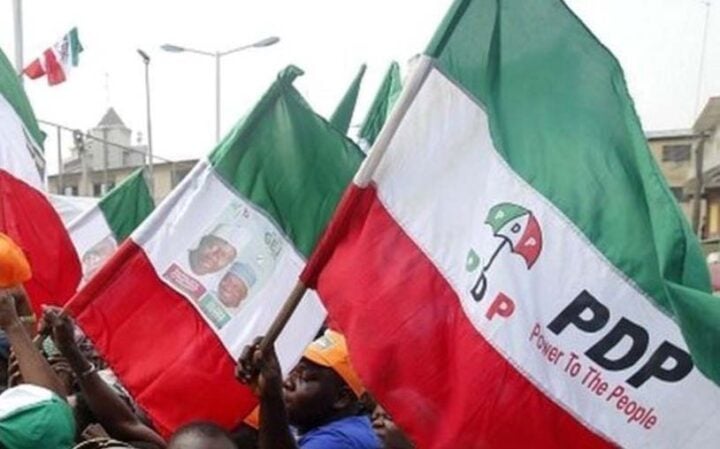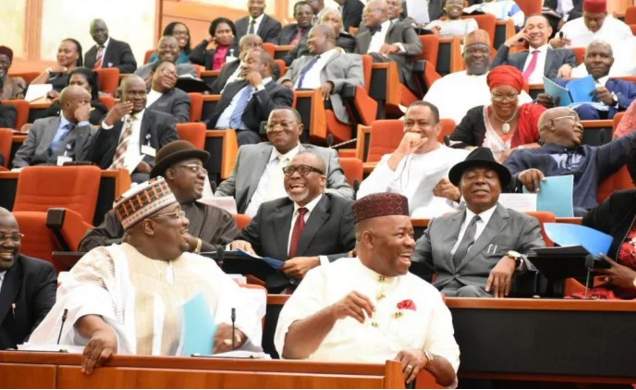The Central Bank of Nigeria (CBN) has waded into the crisis involving Stanbic IBTC Holdings and the Financial Reporting Council of Nigeria (FRC), listing a series of procedural infractions committed by the regulator – rather than the bank – and dismissing all allegations of “financial misstatements” brought against the bank.
On October 26, FRC had urged CBN and the Economic and Financial Crime Commission (EFCC) to investigate Stanbic IBTC and KPMG Professional Services for “financial misstatements”.
It also suspended the registration of four directors of Stanbic IBTC – Atedo Peterside, Sola David-Borha, Arthur Oginga and Dare Owei – and that of its audit engagement partner, KPMG Professional Services, “until KPMG’s innocence is ascertained”.
According to the council, the bank misstated its financial reports for the 2013-2014 fiscal year and ceded its banking application rights to Standard Bank of South Africa against the directives of National Office for Technology Acquisition and Promotion (NOTAP).
Advertisement
“The schedules supplied to the council by Stanbic IBTC revealed that the total fee paid to KPMG Professional Services for non-audit services was inconsistent with what was disclosed in the financial statements for the years under review,” it said.
“In 2014 for instance, a total penalty of N28,000,000 was imposed on the group. Among the contraventions was improper disclosure of public sector deposits in 2014…. Stanbic IBTC seems to have a penchant for poor disclosures which further corroborates the findings in this report.”
Issuing a stern stern response, Stanbic IBTC had described the suspension of the registration of its directors as a recourse to “self-help” and “media publicity”.
Advertisement
It claimed to have met the disclosure requirements of the international financial reporting standards (IFRS), and accused FRC of making “inaccurate and unfortunate” allegations and breaching the procedural guidelines laid down in the law.
“FRCN’s allegations are inaccurate and unfortunate, and the manner in which it has chosen to make them is procedurally defective,” the bank said in a statement issued by Sola David-Borha, its CEO, and Chidi Okezie, company secretary.
“Whilst FRCN takes refuge in Regulation 21 of the Directorate of Inspection and Monitoring Guidelines Regulations 2014 for the wide publicity that it has given to its regulatory decision, Regulation 21 only applies: ‘Where the Panel and the entity agree that accounts are to be rectified by way of revision or restatement’.
“That is not the case here, because Stanbic IBTC does not agree that its accounts are defective or require rectification. Moreover, Regulation 27 makes clear that where a reporting entity does not accept FRCN’s position, FRCN ‘shall institute a legal action against the entity’.
Advertisement
“FRCN has ignored this laid-down process in preference for self-help and media publicity. The matters that FRCN alleges to be wrong are not wrong in any material respect and many are in any event not matters of financial reporting at all, but matters of business decision and judgment for Stanbic IBTC and its board of directors.”
After taking up the invitation of FRC to investigate the allegedly guilty parties, Godwin Emefiele, governor of CBN, wrote a letter dated November 2, 2015 (which is now in TheCable’s possession) to FRC.
In four of the five allegations of infraction levelled against the bank, CBN said it could not spot any wrongdoing. In the only case where it agreed that Stanbic erred, it said the error neither increased nor decreased the bank’s income or expenditure, such as would have caused material “missreprentation of the financials”.
On legal issues, CBN expressed concern about the “apparent failure” of FRC to “follow due process as laid down by its own FRC Act and Regulations, in arriving at the Regulatory Decision”.
Advertisement
After listing a series of regulatory breaches made by the council, CBN said FRC lacked the “authority” for suspension “as was done in this case”.
It therefore declined the request of FRC to take disciplinary action against the bank.
Advertisement
“Indeed, the CBN does not see any reason to advise/compel SIBTCH to obey the sanctions meted to it by the FRC,” read Emefiele’s letter.
“I write in response to your letter dated 26th October, 2015, with reference number FRC/2015/DIM/REGULATORY/001, in which the CBN was notified of a Regulatory Decision (RD) by the Financial Reporting Council of Nigeria (FRC) against Stanbic IBTC Holdings Plc (SIBTCH) over allegations of infractions contained in SIBTCH’s Financial Statements (FS) for the years ended 31st December 2013 and 31st December 2014. The said letter also requested the CBN to sanction SIBTH for alleged infractions,” Emefiele wrote to the executive secretary/chief executive officer of the council.
Advertisement
“The CBN understands that both the Final Notice and Regulatory Decisions were based on the FRC Act No. 6 of 2011 and Regulation 21 of the FRC Guidelines/Regulations for Inspection and Monitoring of Entities 2014 (the Regulations). On the strength of this understanding, we have carefully reviewed these underlying documents, as well as the financial statements of SIBTCH, which are in contention. In addition to relying on our Routine Examination Report on SIBTCH for 2013 and 2014, we have revisited the bank to scrutinize all underlying records relating to these financial statements.
“Consequent upon these due diligence measures, we have the following comments and reactions to the allegations leveled against SIBTCH as contained in the final notice.
Advertisement
“Contrary to the allegation of the FRC that Stanbic IBTC (SIBTC) did not obtain approval from the National Office for Technology Acquisition and Promotion (NOTAP) for the payment of affiliate software license, our review revealed that the bank actually obtained the necessary approval from NOTAP to pay affiliate software license from the Standard Bank South Africa (SBSA), for a period of three years covering June 1st 2012 to 30th May 2015. The remittance from June to date is still awaiting approval from NOTAP.
“With regards to the allegation of non-disclosure of intangible assets in SITBC’s 2013 and 2014 financials, we note that the bank adequately recognized the software as an intangible asset in its 2011 financials and sufficiently disclosed the disposal of the software in the 2012 financials. Consequently, the said software could not have been reported as an intangible asset in the succeeding years of 2013 and 2014.
“With respect to the allegation of lumping several expense items under ‘others’, we are of the view that the items were not material enough to appear as line items in the Income Statement and that the non-disclosure of the items did not materially affect the true and fair view of the financial statements.
“We agree with FRC that SIBTC erred in the classification of some line items. However, the identified misclassification did not understate or overstate its assets and liabilities, neither did it increase nor decrease its income or expenditure, such as would have caused a material representation of the financials.
“SIBTC used its judgment to capture the donation of N275 million under ‘others’ because it was of the opinion that it was not a charitable donation but a mandatory contribution towards the victims of terrorism in the country. For the avoidance of doubt, this contribution was agreed at a Bankers’ Committee Meeting, with the share for each bank clearly spelt out. Therefore, we agree with SITBC’s position, as presented.
“Contrary to FRC’s conclusion, our review of IAS 37 and IAS 32.19 indicate that SITBC had an obligation to accrue the relevant provisions toward the settlement of the franchise and management fees as agreed between it and SBSA.
Legal Issues
“Without prejudice to the foregoing financial issues,the CBN is concerned about the apparent failure of the FRC to follow due process as laid down by its own FRC Act and Regulations, in arriving at the Regulatory Decision. In this regard, the Bank wishes to make the following observations:
“In concluding investigation into possible breaches of FRC Act and/or the Regulations, the FRC is required to give the Entity concerned sixty (60) days from the service of Final Notice to restate its account where both the Panel and Entity agree on the need for restatement. In this cause, our understanding is that FRCN called a meeting with the board of SIBTCH at 11:00am on 26th October 2015. But rather than holding the meeting, FRCN went ahead to convene a press conference at 8am on the same day to announce its sanction against SIBTCH. Our review further indicates that both FRC and SIBTCH did not agree on a need for restatement of the accounts before the sanctions were announced.
“According to the FRC Act, an entity is only punishable under the Act upon conviction by a Court of competent jurisdiction. Yet, in issuing the Final Notice, the FRC had already meted out some punishments to the affected entity, without any conviction by a court.
“While FRC may, following approval of the Minister, review applicable fines, there is no power for compounding offences and imposing penalty in lieu of conviction as was done in this case.
“Both the FRC Act and the Regulation did not provide for the outcome of the investigation to be made known to a rgistered professional or public interest entity and a right of appeal to the Technical and Oversight Committee before resorting to prosecution. In this case, however, there is no evidence that time was allowed to elapse for the appeal process before the imposition of sanction.
“The Regulation provides that if the Entity fails to accept FRC’s position at the end of a Notice period, the Council shall institute legal action against the Entity, rather than mete out sanctions. Yet, in this case, sanctions were meted out without evidence that legal actions have fully been exhausted.
“A combined reading of both the Act and the Regulations shows that there are three types of sanctions that may be imposed for contraventions by Entities.
“These are: imposition of monetary penalty/fine, imprisonment for a term of years; Deregistration of a professional or issuance of Warning Notice. There is however, no authority for suspension of registration of a professional as was done in this case.
IMPLICATIONS OF FRCN’s ACTIONS ON NIGERIA’s FINANCIAL SYSTEM STABILITY
“We are seriously concerned that such a drastic Regulatory Decision could be taken on an entity under the regulation and supervision of the Central Bank of Nigeria (CBN) without any form of consultation with the Bank, specially as the CBN is responsible for promoting a Safe, Stable and Sound financial system. Yet such a Regulatory Decision and the manner of the announcement is not only capable of eroding investor confidence but inimical to financial system stability. Indeed, the FRC’s action has already precipitated a fall in the value of the shares of Stanbic IBTC by about 18 percent since the announcement of the Regulatory Decision.
“In light of the foregoing facts, which clearly show that FRCN did not follow due process, the Bank regrets to inform you that it is unable to accede to your request to take disciplinary action against SIBTCH. Indeed the CBN does not see any reason to advise/compel SIBTCH to obey the sanctions meted to it by the FRCN.
“The CBN would however continue to take all necessary steps to protect the interest of Depositors and to ensure the safety and soundness of the financial system.
“In the interim, please accept the assurances of my kindest regards.”
1 comments







I knew it. The whole thing from the beginning looks like someone is trying to force the horse to drink from the river. Thank you Emefiele for the çlarifications. The likes of FRC should be aware now that there is check and balance in the system.